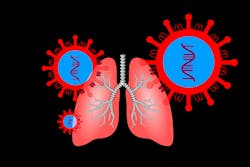Researchers have identified the wide variety of ways in which COVID-19 damages the lungs, according to a news release from University of Texas Medical Branch.
The results were published in Frontiers in Immunology.
COVID-19 is considered an airway and multi-systemic disease, and death has been associated with an uncontrolled immune response. The infection can trigger the immune system to flood the bloodstream with inflammatory proteins called cytokines that kill tissue and damage organs. However, the lung pathology, immune response, and tissue damage associated with COVID-19 demise have not been fully described and understood due to safety concerns.
“Our data shows a range of highly varied SARS-CoV-2-induced lung damages,” said Eliseo Eugenin, PhD, Associate Professor at the Department of Neuroscience, Cell Biology, and Anatomy at the University of Texas Medical Branch and co-author of the study. “These individual differences need to be considered to understand the acute and long-term COVID-19 consequences.”
This study looked at post-mortem lung tissues from uninfected and large lung samples from 11 rapid autopsies with confirmed SARS-CoV-2 infection. Researchers then identified three distinct compositions of COVID-19-induced lung damage, including hemorrhage and immune infiltration. Data from the study offers a new and more complex view of how the virus triggers the damages and contributes to new insights into treatments and the identification of biomarkers that prevent or predict the onset of this devastating disease, the university said.

